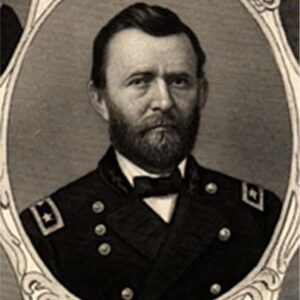HOLY COW! HISTORY: The Gift That Killed General Grant

Watch out for unintended consequences. They’ll get you every time.
It happened 160 years ago when a simple act of courtesy set in motion a chain of events that wound up taking a famous American’s life.
Really.
When you hear “Ulysses S. Grant,” what comes to mind? The more scholarly-minded probably think, “Victor at Appomattox” or “18th President of the United States.” Big drunk, and even bigger cigar smoker, are top answers, too.
Yes, the old Yankee could drink to excess. Though in fairness, he only drank when he was lonely, depressed, and stuck with too much time on his hands. Whenever that happened they sent for Mrs. Grant and the boozing stopped.
As for his love of stogies, he was history’s original Cigar Aficionado. Here’s how it began.
For the first half of his life, Grant smoked something different. A woman who had been a slave on the farm he worked outside St. Louis later recalled, “He smoked a pipe, which his wife threw away whenever she could find it. She detested the pipe … At that time he chewed tobacco excessively also.”
Fast forward to Winter 1862. Grant cooked up a bold plan for a combined army-naval assault on the Confederate strongholds of Forts Henry and Donelson. They protected the Tennessee and Cumberland Rivers, the gateway to Nashville.
The brass in Washington green-lighted the operation. Fort Henry easily fell after a naval bombardment on February 6. Most of its men retreated a dozen miles to the other fort.
Donelson was a different story. Bigger and stronger with more defenders, it was a tougher nut to crack.
The naval flotilla tried again on February 14, but the gunboats were pushed back. Their commander, Flag Officer Andrew Foote, was seriously wounded in his foot. (Foote’s foot; how’s that for irony?)
The next day Foote asked Grant to confer with him on his flagship as he recovered. Foote offered the general a cigar, which Grant lit up as he rode back to headquarters. Years later, Grant described what came next.
“I was met by a staff officer, who announced the enemy was making a vigorous attack. I galloped forward and while riding among the troops giving directions for repelling the assault, I carried the cigar in my hand. It had gone out, but it seems I continued to hold it between my fingers throughout the battle.”
The Yankees repulsed the Confederates and the next morning the Rebels surrendered.
Capturing Fort Donelson was a big deal. Grant had won the Union’s first major victory, also becoming the first general since Washington to capture an entire enemy army. People celebrated across the North. The Chicago Tribune said the Windy City “reeled mad with joy.”
But amid the elation there was a major error. As Grant himself explained, “In the account published in the papers I was represented as smoking a cigar in the midst of the conflict; and many persons, no doubt thinking tobacco was my chief solace, sent me boxes of the choicest brands. As many as ten thousand were soon received.”
Think about that: 10,000 cigars! They came with notes of appreciation. One said, “You keep winning victories and I’ll keep sending cigars.”
Grant “re-gifted” them on a wholesale basis. But he couldn’t keep pace with the deluge. A practical man, he eventually decided, “If you can’t beat ’em, join ’em.” Grant put away his pipe explaining, “I naturally smoked more (cigars) than I would have under ordinary circumstances, and have done so ever since.”
That was an understatement. From then on, soldiers rarely saw Grant without a cigar clamped in his mouth. It reached the point where he was smoking 20 stogies every day (almost one per hour). When the Confederate stronghold of Vicksburg fell the following year Grant was smoking a cigar as he rode off to accept its surrender.
Ironically, as word of his cigar addiction spread, Grant took pains to avoid being photographed while smoking. In fact, only one such image is known to exist.
Meanwhile, the gift boxes kept coming. Grant told a fellow general, “There is one good thing about being the Commanding General. You get the best cigars.”
And yet, some people had problems with Grant’s habit. Consider the open letter to him in a Massachusetts newspaper: “We pray you to abandon your cigar on behalf of young America … Our boys, General! What shall we do with these expanding millions? We had a sufficiency of these young volcanoes before, but your example, running like wildfire, has kindled ten thousand more.”
Still, by the time Grant ran for president in 1868 his supporters sang a popular campaign song called, “A’smokin’ My Old Cigar.” (They just don’t write ditties like that anymore.)
All that puffing eventually took its toll. And the illness it produced brought out the best in Grant as a man.
After leaving the White House in 1877, Grant was swindled out of his life savings by fraudulent investors. It left him flat broke.
Just when things couldn’t get worse for the aging general and ex-president, he was diagnosed with throat cancer. Thousands upon thousands of cigars had finally caught up with him.
Terminally ill and nearly destitute, there was nothing he could leave his wife. (That was decades before former presidents received a pension.) But Grant had one last thing of value.
Battling increasingly intense pain, he set about writing “The Personal Memoirs of Ulysses S. Grant,” finishing it just days before his death at age 62 in 1885. It sold more than 300,000 copies, earning nearly half a million dollars and guaranteeing his widow, Julia, would spend the rest of her life in comfort.
Thus ended the journey that had begun 23 years earlier with the innocent question, “Care for a cigar, general?”
Please follow DVJournal on social media: Twitter@DVJournal or Facebook.com/DelawareValleyJournal


